#coup against bolivia
Text
how many coups are they going to try in bolivia like ........
#i worry#cause this dude was a dumbass#but sadly not all fascists are#but so so glad to see the people of bolivia fighting back against the coup themselves even#the revolutionary values seem to be very much alive there still
1 note
·
View note
Text
June 26, 2024 - Bolivia's union confederation has announced an indefinite general strike against the coup, effective immediately. The Central Obrera Boliviana, which contains all workers and peasant unions is also mobilizing workers and social movements to descend on the capital, La Paz, to repel the coup. [source]
edit: Coup attempt seems to have been defeated already (via @komsomolka [link] / [news source])


#bolivia#coup#coup attempt#2024#unions#workers#la paz#unionism#video#anti-imperialism#socialism#strike#general strike#workers struggle#Central Obrera Boliviana#industrial action
1K notes
·
View notes
Text
The Bolivian masses flooded the streets of La Paz and sent the military packing, crushing an attempted right-wing coup.
It CAN be done. We CAN win.
1K notes
·
View notes
Text
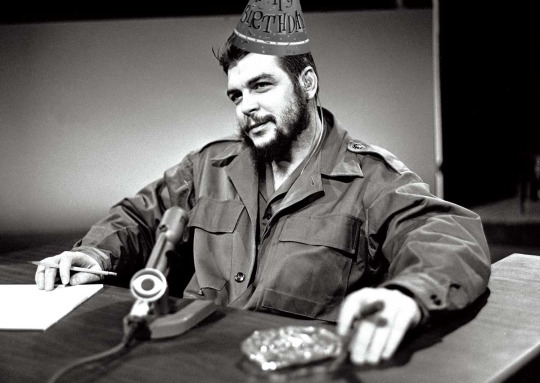
Happy birthday, Che Guevara! (June 14, 1928)
One of the 20th Century's most impactful revolutionaries, Ernesto "Che" Guevara grew up in a well-off family with left-wing sympathies in Argentina. As a young medical student, Guevara embarked on a trek across Latin America which would change him forever, as he came to see the plight of the poor and destitute firsthand. He was further radicalized by his experiences in Guatemala, where he witnessed the coup carried out by the United States at the behest of the United Fruit Company against progressive President Jacobo Arbenz. This event galvanized Guevara's view of the United States as the world's foremost imperial power, one which had to be opposed and fought to achieve economic and social freedom for Latin America, and cemented his commitment to armed revolution as a force for social change. To this end, he joined the forces of Fidel and Raul Castro, and became a leading figure in the Cuban Revolution. During the revolution Guevara helped to established schools and medical facilities for campesinos, and helped lead the revolutionaries to victory in the Battle of Santa Clara. After the revolution, Guevara played a major role in the new Cuban government, overseeing land reform and literacy campaigns. However, he soon felt a desire to continue his revolutionary activities, traveling abroad to support revolutionary movements in Africa and South America. While in Bolivia leading the Ñancahuazú Guerrilla, he was captured and executed by the Bolivian government.
"At the risk of seeming ridiculous, let me say that the true revolutionary is guided by a great feeling of love. It is impossible to think of a genuine revolutionary lacking this quality."
2K notes
·
View notes
Text
Former leftist Bolivian President Evo Morales called Sunday on his country's government to sever ties with "Israel" and declare it a "terrorist state" in light of the massacres it is committing in occupied Palestine and its continuous aggression on the Gaza Strip.
"When we came to power after winning the elections in September/December 2005, we severed our ties with Israel due to our pacifist and anti-imperialistic principles," Morales wrote on X.
He recalled that after the US-backed November 2019 coup, Bolivia obeyed "the orders of the [US] empire" and restored its relations with the Israeli occupation.
22 Oct 23
530 notes
·
View notes
Text




Political violence against Movement for Socialism women politicians in Bolivia after the rightwing coup against Movement for Socialism.

53 notes
·
View notes
Text
Ernst Rohm
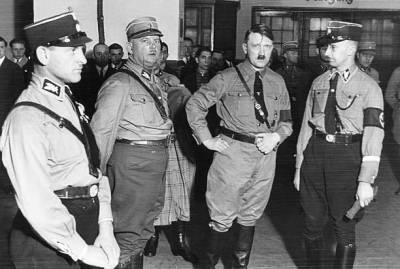
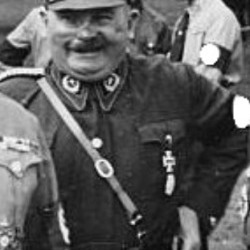
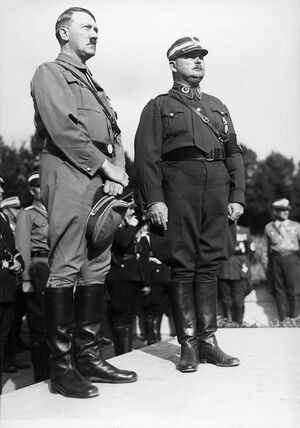
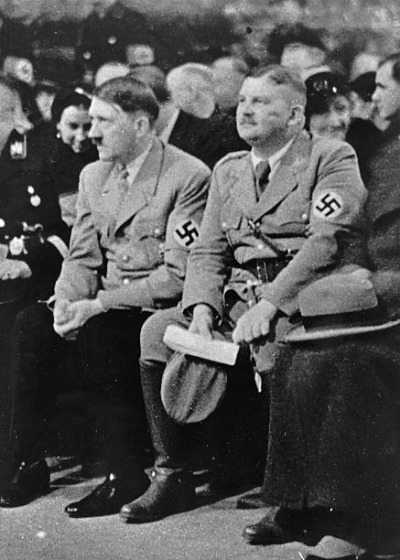

These are some facts and curiosities about Ernst Rohm, The Head of the SA:
He was born on 28th of November, 1887 in Munich.
Although born to a family of state officials and without military traditions, he was a soldier by choice and vocation. His phrase remained famous: "war and unrest attract me more than good bourgeois order".
At the outbreak of the First World War (1914-1918), Röhm served at the front as adjutant of the 1st Battalion of the 10th König Infantry Regiment and the following month was seriously wounded in the face during combat in the Chanot woods in Lorraine. In April 1915 he was promoted to lieutenant and on 20 June 1916 he was decorated with the Iron Cross first class.
At the end of the conflict he returned to Germany where he participated in the ranks of the groups of ex-combatants (freikorps) in the fight against the Bavarian Soviet Republic, proclaimed in Munich after the assassination of its inspirer, Kurt Eisner. Later, he joined the Reichswehr, coming into contact with the extreme nationalist Right.
He addressed Hitler by name and as 'you', the only Nazi to whom this privilege had been conferred.
In 1923 he took part in the Beer Hall Putsch. Shortly afterwards, in 1925, following some conflicts with Hitler, he broke off relations with the leader, agreeing to go to Bolivia to join the local army as a military instructor.
Called home expressly by Hitler in November 1930 to reorganize the SA following the unrest within it, Röhm threw himself enthusiastically into the new task: 170,000 in 1930, in 1933 the SA came to count more than two million members, taking a position of implicit rivalry towards the army.
He was capable of publicly ridiculing Rosemberg's pseudo-mystical ''Aryan philosophy'', causing embarrassment to those who, like Himmler, believed in this philosophy.
He had no respect for those who did not wear uniform and openly despised German civilians whom he dismissed as pigs.
Röhm joined Hitler's first government and was appointed Reichsleiter, the highest position within the NSDAP.
The moment of reckoning came in the summer of 1934, when the Führer received the news, secretly but officially, that the days of the old president, Paul von Hindenburg, were numbered. Hitler himself planned to succeed Hindenburg as president of the Reich, unifying the two positions of president and chancellor in his person and thus making his dictatorship legal and effective.
Hitler needed the immediate support of the army and knew well that, to support his bid for absolute power, it required the sacrifice of Röhm and the SA.
Forced into this difficult position, he absolutely needed a valid pretext to attack Röhm and his former comrades. Röhm's main enemies - Hermann Göring and Heinrich Himmler - took care to provide it to him, assuring him that they had proof that the SA was preparing to carry out a coup d'état against the Reich government, to thus hasten the completion of the "Second Revolution". Most likely it was not true, but Hitler believed - or wanted to believe - the version of his two main lieutenants and ordered them to crush Röhm's putsch.
He died on 1 July 1934 following the night of the long knives.
Sources:
Wikipedia: Ernst Rohm
Paul Roland: Hitler and his Loyalist
if you don't like it go with your life :))
I DON'T SUPPORT NAZISM, FASCISM OR ZIONISM IN ANY WAY, THIS IS AN EDUCATIONAL POST
100 notes
·
View notes
Text

Bolivia’s union confederation has announced an indefinite general strike against the coup, effective immediately. The Central Obrera Boliviana, which contains all workers and peasant unions is also mobilizing workers and social movements to descend on the capital, La Paz, to repel the coup.
#bolivia#class war#161#1312#la paz#general strike#strike#coup attempt#coup#eat the rich#eat the fucking rich#anti military#fuck the military#ausgov#politas#auspol#tasgov#taspol#australia#fuck neoliberals#neoliberal capitalism#anthony albanese#albanese government#anti capitalism#antiwork#anti slavery#fuck the gop#fuck the idf#fuck the police#fuck the patriarchy
8 notes
·
View notes
Text
Brazil's Lula visits Bolivia seeking to unify the left after failed coup
Brazil’s Luiz Inácio Lula da Silva travels to Bolivia for a trip meant to broker peace between President Luis Arce and former president Evo Morales.

Brazil’s Luiz Inácio Lula da Silva is pressing forward with his attempt to unify Bolivia’s splintered socialist movement, a task so tough even a failed coup against President Luis Arce couldn’t make it happen.
Lula arrived in Bolivia late Monday for a trip meant to broker peace between Arce and former president Evo Morales, whose efforts to run against his protégé next year have split their Movement for Socialism (MAS) party and strained the government’s ability to respond to economic woes that have plunged the Andean nation into crisis.
Two weeks after a rogue Army commander’s attempt to bring down the government nearly brought them back together, a truce seems as distant as ever: Morales, who initially condemned the uprising, now accuses Arce of having staged it himself.
The dispute roiling the party that has governed Bolivia for most of the last 20 years is unfolding against the backdrop of a dollar crunch that has caused fuel shortages and pushed it to the brink of financial calamity. Still scarred from a 2023 insurrection attempt against his own government, Lula is seeking to stave off further unrest in the historically turbulent nation that has experienced nearly 200 coups, revolutions or coup attempts since its independence two centuries ago.
Continue reading.
#brazil#brazilian politics#politics#bolivia#bolivian politics#luiz inacio lula da silva#foreign policy#international politics#image description in alt#mod nise da silveira
8 notes
·
View notes
Text
Bolivia’s capital of La Paz is reeling in the wake of an attempted coup as troops led by a top general rammed the doors of the government palace in tumultous scenes that threatened to drag the South American democracy into chaos.
Military forces led by army chief General Juan Jose Zuniga appeared to take control of president Luis Arce’s government by seizing control of the town square and unleashing tear gas on protesters who flooded the streets.
General Zuniga vowed to “restore democracy”, replae and cabinet and free political prisoners, but was condemned opposition leaders as it became clear he had little political support.
Mr Arce refused to bow to the pressure and named a new army commander, who immediately ordered troops to stand down, ending the rebellion.
The president’s supporters rapidly came to his aid and rushed the square outside the palace, waving Bolivian flags, singing the national anthem and cheering.
Mr Arce said: “Here we are, firm, in the presidential palace, to confront any coup attempt.”
General Zuniga and alleged co-conspirator former navy Vice Admiral Juan Arnez Salvador were arrested by authorities.
Government minister Eduardo del Castillo told journalists: “Their goal was to overturn the democratically elected authority,”
The short-lived rebellion followed months of mounting tensions between Arce and his one-time ally, left-wing former president Evo Morales.
Mr Morales, the country’s first Indigenous president, was forced to resign after 14 years in power in 2019 after mass protests against him.
He has since returned from political exile and is threatening to challenge Mr Arce in the 2025 primaries, which has caused a widening rift in their ruling socialist party.
Further fueling tensions in the country is the ongoing economic crisis, with the country’s foreign currency reserves diminishing, its natural gas exports plummeting and its currency peg collapsing.
As police in riot gear set up outside the presidential palace, Bolivians queued at ATMs, formed long lines outside petrol stations and emptied shelves in grocery stores.
Flanked by the newly appointed military chiefs late Wednesday, defense minister Edmundo Novillo sought to reassure the rattled public and shed light on what had happened.
The turmoil began earlier this week, Mr Novillo said, when Mr Arce dismissed General Zuniga in a private meeting on Tuesday over the army chief’s threats to arrest Morales if he proceeded with his presidential bid in 2025.
In their meeting, Novillo said that General Zuniga gave officials no indication he was preparing to seize power.
Just hours later tailed by armored vehicles and supporters, General Zuniga burst into government headquarters and declared that he was sick of political infighting. “The armed forces intend to restore the democracy,” he said.
Members of the country’s fragmented opposition, which General Zuniga claimed to support, rejected the coup before it was clear it had failed.
Prosecutors will seek the maximum sentence of 15 to 20 years in prison for General Zuniga on charges of “attacking the constitution,” he said.
“This grants control to the military and erodes democracy and is an important signpost that the problems of the 2019 coup have not been addressed,” said Kathryn Ledebur, director of the Andean Information Network, a Bolivia-based research group. “Bolivia’s democracy remains very fragile, and definitely a great deal more fragile today than it was yesterday.”
7 notes
·
View notes
Text
A traitorous general wanted to turn against the good people and the president in Bolivia yesterday... The coup failed and the traitorous general and his aides were arrested... The traitorous general’s forces killed 38... The people were victorious and shot down the second American-backed coup attempt in less than five years. Bolivia supported Gaza and recently severed its relationship with the entity

جنرال خائن اراد ينقلب على اخيار الشعب والرئيس في بوليفيا أمس ... فشل الانقلاب وتم القبض على الجنرال الخائن ومعاونيه... قتلت قوات الجنرال الخائن ٣٨ .. انتصر الشعب وأسقط ثاني محاولة للانقلاب مدعومة أمريكيا خلال أقل من خمس سنوات. بوليفيا ناصرت غزة وقطعت علاقتها مع الكيان مؤخرا
#palestine#gazaunderattack#free palestine#israel is a terrorist state#America is the sponsor of terrorism
8 notes
·
View notes
Text

Happy birthday, Evo Morales! (October 26, 1959)
President of Bolivia from 2006 to 2019, Evo Morales was the first President to be part of the country's indigenous population. A part of the Aymara people, Morales grew up in a rural farming community in Oruro Department. Morales settled in El Chapare, becoming a coca farmer and becoming active in the trade's labor union. This period served as Morales' political awakening, as he witnessed the destructive effects of the United States' War on Drugs on the traditional coca trade of Bolivia, a major element of indigenous Bolivian culture. Morales became involved in direct action in opposition to the Bolivian government's attempts to eradicate coca and the US' imperialism. Already recognized as a leader in the indigenous movement in Bolivia, Morales' profile would rise through the 1990s as he became involved in electoral politics, coming to lead the Movement for Socialism–Political Instrument for the Sovereignty of the Peoples (MAS-IPSP or MAS). MAS started to gain popularity in the early 2000s despite the Bolivian right's attempts to marginalize and stifle Morales, and Morales was elected President in the wake of the gas conflict which caused the government of Gonzalo Sánchez de Lozada to collapse. An ideological socialist, anti-imperialist, and supporter of indigenismo, Morales revitalized the Bolivian economy, eradicated illiteracy in the country, and championed social reforms against racism and to promote indigenous culture, among other achievements. Morales promoted labor rights and led Bolivia in adopting a new constitution in 2009. Morales' efforts to seek a fourth term in office and plans to nationalize Bolivia's lithium supply precipitated a coup which forced him from office in 2019, and he remained in exile for a year before returning to Bolivia after MAS regained power in the 2020 election. He remains the leader of MAS.
"Every day, we are reminded of the duty to continue our struggle against imperialism, against capitalism, and against colonialism. We must work together towards a world in which greater respect for the people and for Mother Earth is possible. In order to do this, it is essential for states to intervene so that the needs of the masses and the oppressed are put first. We have the conviction that we are the masses. And that the masses, over time, will win."
271 notes
·
View notes
Text
The following are reactions from political leaders across the Americas to the ousting of Pedro Castillo as Peru's president on Wednesday
[AMLO]
"Non-intervention and self-determination is a fundamental principle of our foreign policy. That is what we stick to in the case of what happened in Peru.
"We consider it unfortunate that, due to the interests of the economic and political elites, from the beginning of Pedro Castillo's legitimate presidency, an environment of confrontation and hostility was maintained against him until it led him to make decisions that have served his adversaries to carry out his dismissal"
U.S. STATE DEPARTMENT
"The United States welcomes the appointment of President Boluarte and looks forward to working with her and her administration [...]
[LULA]
"I followed with great concern the events that led to the constitutional removal of the president of Peru, Pedro Castillo.
"It is always regrettable that a democratically elected president has this fate, but I understand that everything was forwarded in the constitutional framework."
CHILE FOREIGN MINISTRY, ON TWITTER
"The Government of Chile condemns the rupture of constitutional order in Peru and appreciates that the political crisis coming out of it is being addressed through institutional channels."
LUIS ARCE, PRESIDENT OF BOLIVIA
"From the beginning, the Peruvian right tried to overthrow a government that was democratically elected by the people, by the working class seeking more inclusion and social justice."[...]
EVO MORALES, FORMER PRESIDENT OF BOLIVIA, ON TWITTER
"Our deep concern for the political crisis affecting the sister Republic of Peru.
"Beyond mistakes and successes, our brother Pedro Castillo and his family deserve humane treatment. This proves once again that the Peruvian oligarchy and the U.S. empire won't accept that union leaders and indigenous people can come to lead government."
HONDURAS FOREIGN MINISTRY
"The Honduran foreign ministry energetically condemns the coup d'etat in Peru, which is the result of a series of events meant to erode democracy and the sovereign will of the people represented by President Pedro Castillo."
8 Dec 22
203 notes
·
View notes
Text



In the aftermath of the coup against Evo Morales, former members of his government we held as political prisoners-
Lorgia Fuentes, tortured and chained by the Añez regime
Lorgia Fuentes, victim of the coup d'état, questioned this Tuesday that the former de facto president, Jeanine Áñez, asserts that her rights are violated, when she does not suffer torture and access to health is respected.
Fuentes was tortured during the Áñez regime and chained to a hospital stretcher when she was in poor health. She was accused without evidence of having links with former authorities of the Evo Morales government, for which she was deprived of liberty at the Obrajes Women's Orientation Center in La Paz.
On that occasion, the Spanish journalist Alejandro Entrambasaguas joined the process against Fuentes to present alleged evidence to the Public Ministry and accuse her of illicit enrichment; However, he failed to prove what was reported and did not respond to calls to give informative statements on the case to date.
“I have suffered a cerebrovascular accident and four months later, on January 15, I was electrocuted by Mrs. Áñez's Government. On January 21, Entrambasaguas went out in search of me, but he did not find me; On January 25, Mrs. Áñez announced her intention to be a candidate for the Presidency and a few days later, as the press already knows, she arrested me, I went to jail, there was no mercy for me, there was no justice," she said in interview with Bolivia TV.
Fuentes assured that during the regime his family suffered harassment and that he even received warnings that his six-year-old son was going to be disappeared.
“No one is electrocuting Ms. Áñez like me, no one has her chained like I was; but, above all, Mrs. Áñez is not being deprived of what is the right to health, in addition to the fact that she was not sick, she does not have an underlying illness like I have had, a cerebrovascular infarction, which she had its immediate sequence or its second cerebrovascular infarction the day they electrocuted me, because they electrocuted me until I had convulsions,” Fuentes lamented.
Lorgia Fuentes, who was prosecuted and detained in 2020 due to information disseminated by the Spanish journalist Alejandro Entrambasaguas, questioned the media's handling of her case at that time. She described the situation as “embarrassing media orgies.”
In a text sent to this medium, Fuentes recalled that in February 2020, information was disseminated that Entrambasaguas had presented evidence against him to the Prosecutor's Office.
Then, Entrambasaguas stated that he had an audio recording in which it was heard that Lorgia Fuentes had installed a closed circuit of video surveillance cameras in a home, with which orgies of senior officials of Evo Morales' government had been recorded.
Fuentes considered what happened in February 2020 as a “sexist media show,” because she was also presented as the “alleged lover” of former minister Carlos Romero.
He questioned that the recordings referred to by the Spanish journalist had not been offered and that it had not been mentioned that Entrambasaguas left Bolivia that same day.
Fuentes considered that in that case there was “gigantic coverage forced from above in the Bolivian media, which with little self-esteem and shamefully lowering their eyes had to follow the flow of the tabloid licentiousness of expression.”
“The circus is gone. "Bolivia is slow, but little by little it is returning to normal relations, which, despite the internal political fights, still maintain certain values, limits and modesty," says the text signed by Fuentes.

“I was a political prisoner throughout the Áñez government. They set up a case using a supposedly investigative journalist, the Spaniard Alejandro Entrambasaguas, who has done terrorist work, linking me to contracts with the Chinese government and being a close friend of former minister Carlos Romero,” she recalled.At that time, the pseudo journalist Entrambasaguas acted with impunity in the country under the protection of Arturo Murillo, Minister of Government of the de facto regime, in order to incriminate former authorities linked to the Movement Towards Socialism (MAS).
In this particular case, she boasted of having conclusive evidence to prosecute Fuentes for the crime of illicit enrichment and of being Romero's alleged lover, documents that she never showed but that were used by the Prosecutor's Office to imprison her.
Chained to a hospital bed, she remained there for several days by direct order of former Minister Murillo before being transferred to the Obrajes prison.“I have been chained, apart from being chained I was tortured when I had to be fed with a tube, that is how I was treated all that time. Now I ask for justice, there are many who say it is revenge, it is not revenge, it is justice, because many families were affected and tortured by the Áñez government,” Fuentes demanded.

Rightwing media attempted to spread lies about the identity of the woman in chains, to which she responded to on Twitter in 2022.
A certain Hernán Terrazas lies, claiming that the photo of a chained woman "belongs to another country." Which one? Chávez's Venezuela? Communist Cuba? Or Evo's Bolivia? Nope, the photo is mine, from February 2020 during the presidency of a woman, @JeanineAnez. So, now was it a coup now?
7 notes
·
View notes